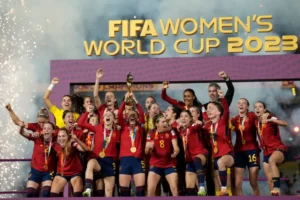The anticipation was high for the 2027 Women’s World Cup bid, with fans around the world eagerly awaiting the chance to see their favorite teams compete on the global stage. However, just when it seemed like everything was falling into place, news broke that both the U.S. and Mexico had decided to withdraw their bids. What could have led two powerhouse nations to step away from such a prestigious event? In this blog post, we will delve into the reasons behind this unexpected turn of events and explore what it means for the future of women’s soccer.
Introduction to the 2027 Women’s World Cup bid and its withdrawal
On May 17 in Bangkok, Thailand, the FIFA Congress will vote on the 2027 host, with the U.S.-Mexico joint bid as one of three finalists. This highly anticipated event was set to be a milestone in women’s football, with both countries boasting successful women’s national teams and a strong fan base for the sport.
As part of their bid proposal, both USSF and FMF emphasized their commitment to promoting gender equality in football and creating a legacy that would inspire future generations of female players. They also promised state-of-the-art facilities, top-notch infrastructure, and an unforgettable experience for players, fans, and officials alike.
However, just over a year after announcing their bid, both federations made headlines when they withdrew from the race to host the 2027 Women’s World Cup. This sudden decision sent shockwaves through the football community, leaving many wondering what could have led to such a drastic change in plans.
Reasons for the withdrawal by U.S. and Mexico
There was widespread disappointment and confusion when the United States and Mexico announced their decision to withdraw from bidding for the 2023 Women’s World Cup. Both countries had been considered strong contenders for hosting the prestigious tournament, with a history of successful sporting events and well-developed infrastructure.
However, there were several key reasons cited by both countries for their withdrawal from the bid process. The first reason was financial concerns. Mexico and the U.S. are already co-hosting the 2026 men’s World Cup with Canada. After Los Angeles hosts the 2028 Summer Olympics, the Women’s World Cup would have to compete for sponsorships and other resources. Here you can get more great-quality USMNT jersey 2024 for less money!
Another factor that played a role in the decision to withdraw was timing. The bidding process for hosting major tournaments like the Women’s World Cup is lengthy and requires years of planning and preparation. For both U.S. and Mexico, this coincided with other major sporting events taking place in their respective countries during similar time frames.

While disappointing for fans and players alike, this withdrawal does not mean an end to hosting future Women’s World Cups in either country. Rescheduling the bid will allow them to host an unprecedented Women’s World Cup in 2031, contributing to the growth of women’s soccer domestically and internationally.
What does this mean for future Women’s World Cups?
Firstly, it is important to note that this decision does not diminish the popularity or significance of the Women’s World Cup. In fact, it highlights the growth and competitiveness of women’s football on a global scale. The fact that multiple nations were vying to host this tournament is a testament to its growing popularity and importance in the world of sports.
On a positive note, this could open up opportunities for other countries to step up and bid for future Women’s World Cups. It would provide an opportunity for newer hosts to showcase their capabilities in organizing such a major international event and potentially contribute towards further developing women’s football in their respective regions.
Furthermore, it may also bring attention towards addressing gender inequality within football federations across different parts of the world. By having more diverse hosts – it can help promote inclusivity within football governance and bring about positive changes in the sport.
While the withdrawal of U.S. and Mexico from bidding for the 2023 Women’s World Cup may have raised concerns, it also presents an opportunity for others to step up and prove their capabilities. This could potentially lead to a more diverse range of hosts in the future, promoting inclusivity and growth of women’s football on a global scale.